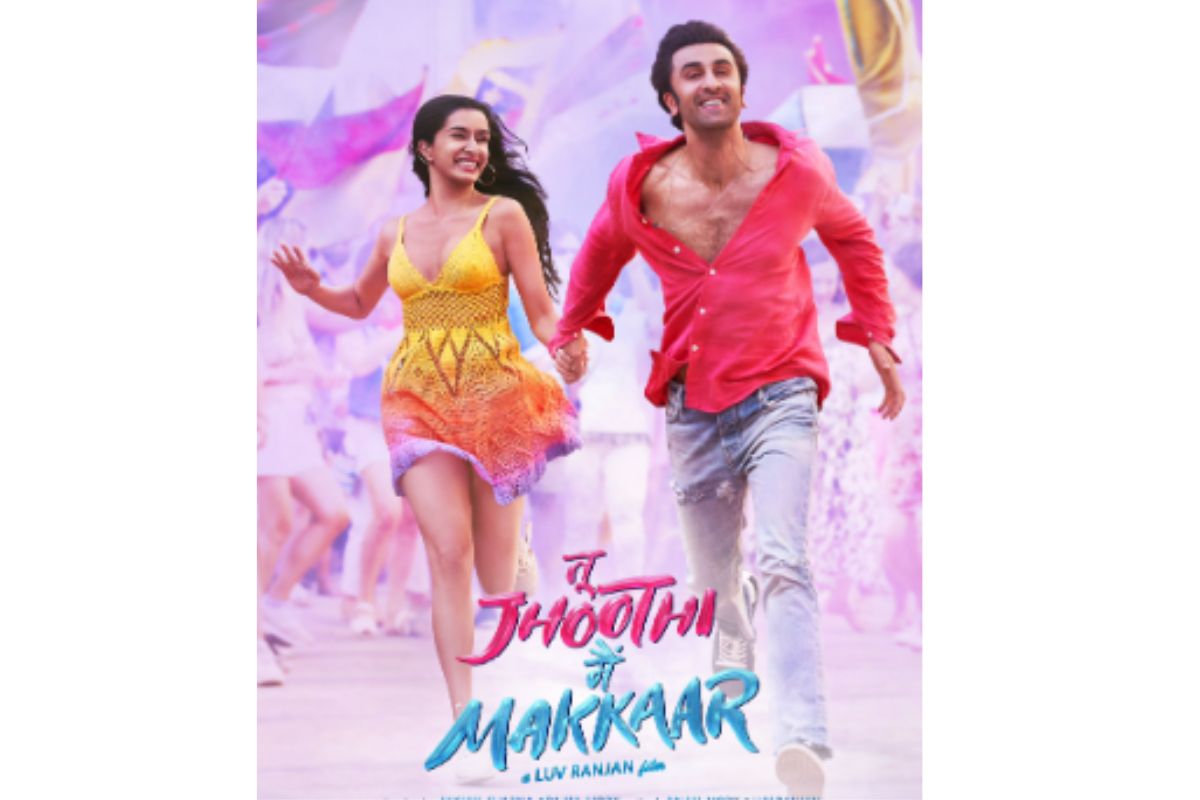Ranbir Kapoor on reuniting with Sanjay Leela Bhansali for ‘Love And War’
Ranbir Kapoor teams up with Sanjay Leela Bhansali after 17 years for 'Love And War', alongside Alia Bhatt and Vicky Kaushal.
Had it not been for Ranbir Kapoor, most of the jokes would have been tiring and fallen flat. It is his spontaneity and ability to perform effortlessly that keep the audience engrossed.

Tu jhoothi main Makkar poster [Photo:Instagram/Shraddha Kapoor]
Director: Luv Ranjan. Cast: Ranbir Kapoor, Shradha Kapoor, Dimple Kapadia and Boney Kapoor.
Music: Pritam. Cinematography: Santhana Krishnana Ravichandran.
IANS Rating: **1/2
Luv Ranjan, who has often been accused of being misogynistic as nearly all his female characters (‘Pyar Ka Punchnama’ 1 and 2; ‘Aakashvani’; ‘Sonu Ke Titu Ki Sweety’ and ‘De De Pyar De’) are substantial, but mostly negative. The women in his films have been manipulative and the men have suffered in their hands.
With his latest rom com, ‘Tu Jhoothi Main Makkaar’, Luv Ranjan seems to be on a remedial course, for this time his female lead is all-independent, modern and carefree but with a solid sense of commitment. For a change, it is the male lead who is a bit of a brat and a tad unscrupulous. Now, coming from Luv Ranjan, this story is definitely a complete turnaround!
Advertisement
Mickey (Kapoor) leads a lavish lifestyle that his parents (Boney Kapoor, in his first screen appearance, and Dimple Kapadia) with their multiple business interests (automobiles, jewellery, and so on) have provided him with.
His constant companion is childhood friend Anubhav Singh Bassi, who is facing commitment phobia just before his engagement. The two also make money on the side by being experts on solving issues and manipulating ‘break-ups’ between young couples who are dating but have relationship issues.
Mickey falls for Tinny (Shradha Kapoor) at first sight and swears undying love for her. What follows is complete madness when Mickey, considered to be a skilled specialist player in the world of romantic affairs, finds Tinny irresistible and engages with her in a battle of wits.
He talks nineteen to the dozen, forcing her to start liking him too. Soon, the two grow very close to each other and further cement their bond by sleeping with each other on the premise that sooner or later they would formalise their association.
When Mickey’s parents get to know of her, they immediately decide to celebrate, much to Tinny’s amazement. It isn’t just the rapidity of events that surprises her, she is overawed by and snowed under so much love and interference into her privacy. Micky’s family begin to decide what all arrangements need to be done on her behalf and even suggest that she leave her job and join their family business. That leaves her exhausted.
Tinny dials the break-up service number and ends up calling Micky and his team for help. Unbeknownst to who the caller is, Mickey starts offering his golden pieces of advice for a hefty sum of money of course. What follows ensues is not funny, but much more complicated as their engagement ceremony date gets confirmed, and the two go about making all the required arrangements too.
The 164-minute film has nothing concrete in terms of story development and the first half is spent on Mickey displaying his charm and trying every trick in the book to impress Tinny. In a script that expects him to talk the hindlegs out of a donkey, he is perfectly cast as the wooer. A natural performer, he also looks great and easily gets into the skin of his character.
Shradha, on the other hand, is hardly the drop-dead gorgeous that she is made out to be, though her bikini bod is sexy enough. Their onscreen chemistry sizzles at times and falls flat the next moment when the two seem to be trying too hard. What is clearly in favour of the thin storyline is the fast-paced occurrences that leave little room for any breathing space.
But the film defies logic — not that one is looking for any — and is too focused on absurdities that remind us of the 1970s drama in films when two people, failing to identify the caller, could be easily fooled. And to think that there’s so much ongoing drama could be so exhausting, makes you struggle to firmly remain seated.
If Ranjan’s motive is to win back not just feminists, but even other movie watchers who just hated his one-sided interpretation of the so-called modern young woman as the ‘chaloo gold digger’ or the fickle unfaithful all out to have her way and call the shots, he manages to turn the tables this time.
Towards the end, the jaded film lets go of its romantic overtone and transforms into a family drama with the protagonist asserting his everlasting abiding love for his parents, grandmother, sister and everyone else in the family.
The woman too, after exhibiting an independent mind and flaunting her self-governing, self-regulating free and liberated spirit has a change of heart — after all, she is an Indian woman. And when she is quick to get into bed with a man, she’d better remain devoted to him and not come across as too progressive here!
Veteran Dimple Kapadia screams her head off throughout and should have been used in a better way. Her onscreen husband Boney Kapoor, who makes his screen debut, is almost non-existent and mostly merges with the background.
Had it not been for Ranbir Kapoor, most of the jokes would have been tiring and fallen flat. It is his spontaneity and ability to perform effortlessly that keep the audience engrossed. If only there was some substance and material to play around with!
What also works for the film are Santhana Krishnan Ravichandran’s brilliant camerawork and also Amitabh Bhattacharya’s lyrics and foot-tapping numbers in Arijit Singh’s velvety voice set to music by Pritam.
Advertisement